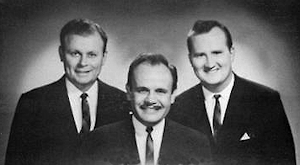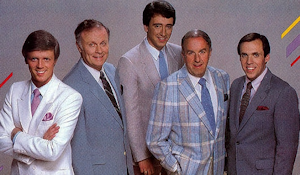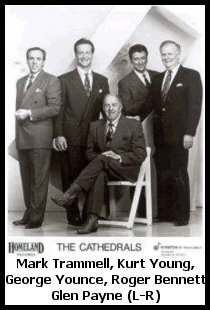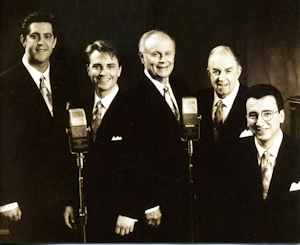 1963 - Glen Payne, Danny Koker, Bobby Clark |
Group MembersTenor |
 1983 - Kirk Talley, Glen Payne, Roger Bennett, George Younce, Mark Trammell |
 1990 |
 1998 - Ernie Haase, Scott Fowler, Glen Payne, George Younce, Roger Bennett |
The Cathedral Quartet (AKA The Cathedral Trio)(1963-1999)
History
The Cathedral Trio—Bobby Clark, Glen Payne, and Danny Koker—was formed at the Cathedral Of Tomorrow in Akron, Ohio in 1963. In 1964, they added bass George Younce and became a quartet. For the first seven years of their existence, they performed and travelled with evangelist Rex Humbard, the pastor of the Cathedral of Tomorrow. In 1968, tenor Bobby Clark left; he was replaced by Mack Taunton. Baritone and pianist Danny Koker left in 1969; he was replaced by baritone/pianist George Amon Webster. Also in 1969, Glen Payne and George Younce made the Cathedrals a separate business entity. Though they were no longer a part of the Cathedral of Tomorrow in Akron, they kept their home base in Stow, Ohio.
Over the next few years, the quartet struggled to survive. During this time, several tenors, baritones, and pianists stayed with the group for brief stints. Roger Horne replaced Mack Taunton at tenor; Bobby Clark returned briefly after Horne left. Horne, Roy Tremble, and Bill Dykes all served short stints at the baritone position. Lorne Matthews, Jim Garstang, and a newly returned George Amon Webster all played piano during this time. In 1974, the Cathedrals established a stable lineup that would last for several years; Roy Tremble moved to the tenor position, George Amon Webster returned to the baritone position, and Haskell Cooley joined as pianist. They moved into the second tier of Southern Gospel groups with their 1974 single “The Last Sunday.” They finally started getting airplay on radio stations and winning awards.
During the late 1970s, Bill Gaither started introducing the Cathedrals to a contemporary audience through his PraiseGathering events. Though their popularity started expanding, the group took a severe hit in 1979 when three group members (Tremble, Webster, and newly returned pianist Lorne Matthews) left to form their own trio, the Brothers. However, Younce and Payne began to regroup. In 1979, they hired Kirk Talley to sing tenor and Steve Lee to sing baritone and play piano. Later that year, Talley and Lee convinced the elder Cathedrals to hire 20 year old Roger Bennett as pianist for the group. In 1980, Lee decided that he did not want to perform with a full-time quartet and was replaced by Kingsmen bass guitarist and vocalist Mark Trammell. One of the most popular Cathedrals lineups had formed.
This lineup lasted until until late 1983, when Kirk Talley left to form the Talleys. He was replaced by Singing Americans tenor Danny Funderburk. From the fall of 1986 to 1988, when Roger Bennett left the Cathedrals for about two years, Gerald Wolfe played the piano. He also sang vocals, most notably on the Cathedrals hit song “Champion Of Love” from their Symphony Of Praise project. After Gerald Wolfe left the Cathedrals in December 1988 to pursue a solo career, Roger Bennett returned and stayed with the Cathedrals until the group retired. In 1987, George Younce had a heart attack. After a slow and difficult recovery, he was eventually able to return to the road. In early 1990, Danny Funderburk left the Cathedrals to become a founding member of Perfect Heart. After Kurt Young sang with the group for about two months, Ernie Haase joined the group in the Spring. In the fall of that same year, Mark Trammell left the group, to become one of the founding members of Greater Vision, along with former Cathedral Gerald Wolfe. Trammell was replaced by Scott Fowler.
This lineup of the Cathedral Quartet—with Ernie Haase singing tenor, Glen Payne singing lead, Scott Fowler singing baritone, George Younce singing bass, and Roger Bennett playing piano—lasted through the Cathedrals’ retirement. In early 1999, The Cathedrals announced they would be retiring at the end of the year due to George Younce’s declining health. Their final year was bittersweet, however. Lead singer Glen Payne was diagnosed with liver cancer and passed away before the farewell tour was completed. Roger Bennett sang Glen's part at their final concerts.
Awards
GMA Hall Of Fame (1999)
Singing News Fan Awards
Favorite Group (1982, 1983, 1984, 1986, 1987, 1994, 1995, 1996)
Favorite Traditional Male Quartet (1997, 1998, 1999)
Album of the Year (1990 - I've Just Started Living; 1995 - High And Lifted Up; 1996 - Reunion; 1999 - Faithful)
Song of the Year (1983 - Step Into The Water; 1995 - Jesus Has Risen)
Favorite Video (1986 - Cathedrals In Concert; 1995 - Reunion; 2000 - A Farewell Celebration)
Discography
Due to the large number of projects the Cathedrals produced, the discography has been divided by decade to make for easier loading and viewing. Please click on one of the links below to access the decade page you wish to view.
1960s 1970s 1980s 1990s 2000s & 2010s
